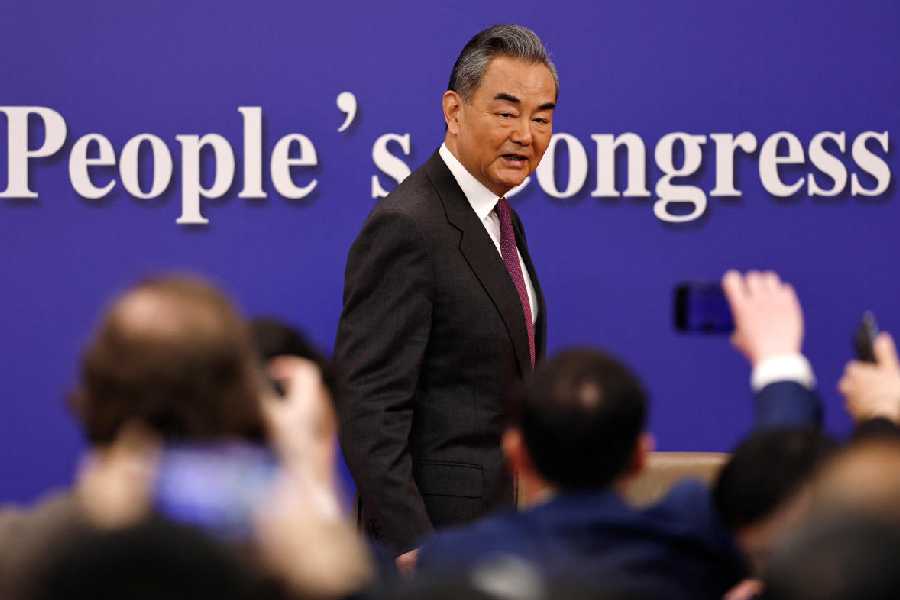China's foreign minister Wang Yi on Thursday took a belligerent stance on the disputed South China Sea, warning of "justified actions" to defend its sovereignty claims and chided the US for not implementing its commitments to improve bilateral ties.
Wang, in his customary annual press conference on the sidelines of the Parliament session, took officially vetted questions from the national and international media on varied topics of global significance.
Wang 70, a veteran diplomat and member of the Politburo of the ruling Communist Party of China (CPC) abruptly took over as Foreign Minister last year after his junior Qin Gang was dismissed. The fate of Qin is not known yet.
There was speculation about Wang being succeeded by Liu Jianchao, the Chinese diplomat currently heading the international department of the CPC, but there was no announcement about it.
Wang, in his nationally televised press meet that lasted nearly 90 minutes, spoke sternly on the South China Sea disputes as he warned that “China will take justified actions to defend its rights in accordance with the law, and respond to unwarranted provocations with prompt and legitimate countermeasures in the South China Sea.” His comments came as the South China Sea dispute returned to haunt Beijing with the Philippines, backed by the US, began asserting its claims confronting the Chinese coast guard ships with its naval assets.
China claims most of the South China Sea. The Philippines, Vietnam, Malaysia, Brunei and Taiwan have counterclaims.
“The Chinese people have lived and worked in the South China Sea for generations,” Wang said about China’s claims.
“For unreasonable provocations, we will take just countermeasures,” Wang asserted. “We also advise certain countries outside the region not to stir up trouble, choose sides, and not to become disruptors and troublemakers in the South China Sea.” On Taiwan, which China claims as part of its mainland, he struck an aggressive note, warning that those who still connive at and support “Taiwan’s independence” are challenging China's sovereignty.
“Our bottom line is also quite clear: We will never allow Taiwan to be separated from the motherland,” he said and sought to dismiss the recent Presidential election in Taiwan, in which a pro-independence leader Lai Ching-te won, as a “local election.” He said more countries are backing Beijing's one-China policy. China views Taiwan as a rebel province that must be reunified with the mainland, even by force. China had staged several provocative military drills around Taiwan following some high-profile visits by American lawmakers.
“There will be a family photo of the whole international community in which all members uphold the one-China principle. It is only a matter of time,” he said.
On the China-US ties, Wang said Washington should honour commitments on bilateral ties.
Peaceful coexistence is the baseline, Wang said. Conflict and confrontation between two major countries like China and the United States would have unimaginable consequences.
The US side's wrong perception of China still persists, and the commitments it made have not been truly fulfilled. Its list of unilateral sanctions continues to lengthen, he said, adding: “If the US says one thing and does another, where is its credibility as a major country? If it gets jittery whenever it hears the word 'China,' where is its confidence as a major country?” he said.
“If it only wants itself to prosper, but denies other countries legitimate development, where is international fairness? If it persistently monopolises the high end of the value chain and keeps China at the low end, where is fairness and competition?” he asked.
Wang’s comments on the US come as the Biden administration steps up controls to narrow the kinds of high-end technology that can be accessed by China.
Wang also accused the US, without mentioning it by name, of stirring up trouble in Taiwan and the South China Sea.
On the North Korean issue, he said anyone undermining peace and stability in the Korean Peninsula region will pay a heavy price.
He also made a strong pitch for a bigger role for BRICS, (Brazil, Russia, India, China, South Africa), saying that it is a growing force for global peace and justice.
The five-member BRICS bloc is set to double its membership with the inclusion of Egypt, Ethiopia, Iran, Saudi Arabia and the United Arab Emirates.
“BRICS should not be seen as a challenge. In the broader sense, BRICS expansion reflects the collective rise of the Global South and the world evolving faster to the multi-polarity consisting of emerging markets and developing countries,” Wang said.
He reiterated China’s support for the UN reforms, including the UN Security Council but remained vague about Beijing’s proposals.
India and several emerging economies accuse China of blocking the UNSC reforms to retain its power.
China supports the UN in holding the Summit of the Future and reaching a Pact for the Future that benefits all parties, he said.
He also called for ending the Ukraine conflict saying that Beijing backs holding, in due course, an international peace conference.
On the Israel-Hamas conflict, he said there should be a broad-based and authoritative international peace conference to come up with a road map to end the crisis and the international community should promote an immediate ceasefire and work for a two-state solution to resolve the Palestine issue.
He defended the close China-Russia ties, saying that both have forged a new paradigm of major-country relations that differs entirely from the obsolete Cold War approach.
Based on non-alliance, non-confrontation and not targeting any third party, China and Russia strive for lasting good-neighbourliness and friendship and seek to deepen their comprehensive strategic coordination, he said.
Wang also announced a visa-free policy for Switzerland, Ireland, Hungary, Austria, Belgium and Luxembourg on a trial basis, starting March 14.
Except for the headline, this story has not been edited by The Telegraph Online staff and has been published from a syndicated feed.











